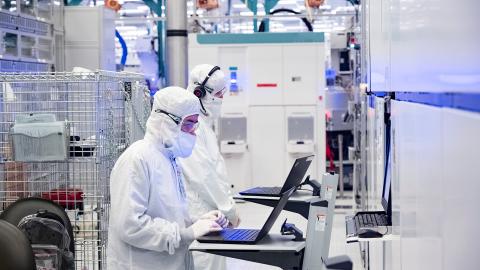In a major move to bolster the global semiconductor supply, Israel has approved a $3.2 billion grant for Intel’s planned state-of-the-art $25 billion chip fabrication facility. The subsidy accounts for nearly 13% of Intel’s total Kiryat Gat site investment, signifying robust government support.
Intel declared the expansion of its manufacturing capacity as a key to success for its strategy to foster more integrated production across the U.S., Europe, and Israel. The tech giant currently operates four Israeli development and manufacturing locations employing around 12,000 workers.
Beyond direct Intel jobs, its presence indirectly supports 42,000 additional positions domestically. With strong existing roots, Israel presents a logical location for Intel to invest, grow, and to ultimately strengthen the semiconductor supply chain.
A Big Chunk of Israel’s GDP Comes from Intel and its Exports
Construction is already underway at the Kiryat Gat location with a few facilities being scheduled to be completed by 2027. The plant will utilize innovative Intel ultraviolet lithography methods and it should be inaugurated in 2028 while operations should formally commence in 2035.
In addition to the $3.2 billion state grant, Intel is committed to procuring another $16.6 billion in domestic goods and services over the next ten years. The soon-to-be-built advanced manufacturing plant is expected to create several thousand skilled local jobs as well.
The generous terms reflect Israel’s motivation to keep attracting long-term foreign direct investments and its associated economic benefits. Intel’s exports reportedly contribute around 5.5% to the country’s gross domestic product (GDP), demonstrating the sector’s immense value to the Middle East economy.
Intel Remains Committed to Invest in the Region Despite Geopolitical Tensions
The decision to extend this grant to Intel follows the adoption of controversial legal reforms threatening mass protests in Israel. With considerable domestic turmoil resulting from a major shakeup to the country’s judiciary system, Intel’s largesse marks a stabilizing force and badge of confidence reassuring market stability.
Likewise, as Israel combats chronic security challenges, support from large US corporations sends a signal to both the market and the country’s enemies regarding the resilience of its backers to keep fostering its development. The chipmaker’s commitment to help grow the local economy was further demonstrated after the company acquired the Israeli autonomous vehicle innovator Mobileye back in 2018 for over $15 billion.
Geopolitics undoubtedly have a role into Intel’s strategic considerations. However, it appears that the firm is ready to take on the risks associated with an ongoing armed conflict and its implications and will not stop pushing forward its ambitious plans despite these roadblocks.
Germany and Italy Also Gain Big from Intel’s Global Manufacturing Expansion Plans
Beyond robust Israeli subsidy terms, Intel has secured commitments from Germany worth nearly $11 billion for developing its cutting-edge semiconductor plant in the country as part of a plan that initially consisted of a €17 billion investment but that was later on enlarged to accommodate a much higher €30 billion commitment.
The company has also been discussing the possibility of deploying similar projects in Italy but has not yet confirmed its plans as the details are still being worked on with local authorities, possibly awaiting confirmation of similar subsidies if they were to move forward. Initial reports point to a planned investment exceeding $5 billion for a packaging facility.
Intel is also working on projects in Ohio and Arizona to balance its geographical diversification and help the US achieve supply chain autonomy in the crucial semiconductor market.
These investments come in response to the imbalances that the sector has been experiencing in the past few years to keep up with rising demand from data centers, cloud service providers, automobile companies, crypto mining equipment manufacturers, and now even more so amid the rise of artificial intelligence and its corresponding heavy computing workloads.
Earlier this month, Intel unveiled two new AI chips that will help power data centers and edge computing devices for the new era of ultra-smart applications.
The company has now entered a battlefield where it will compete with other well-established chipmakers like Nvidia and AMD and emerging tech companies whose cloud infrastructures are demanding enough to justify that they engage in the design and manufacturing of their own chips – i.e. Microsoft and Google.
